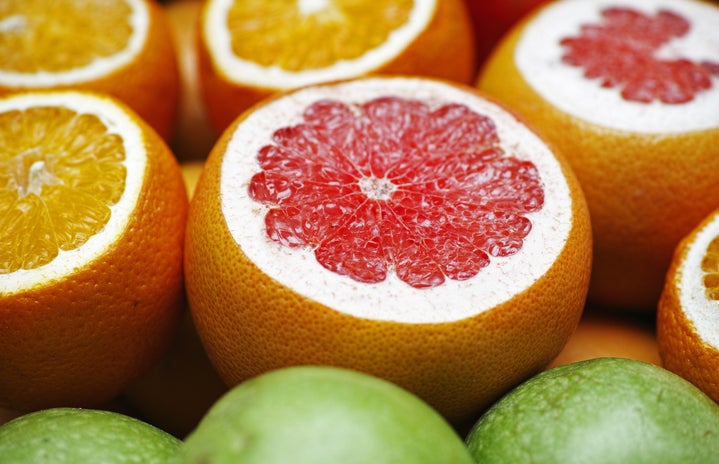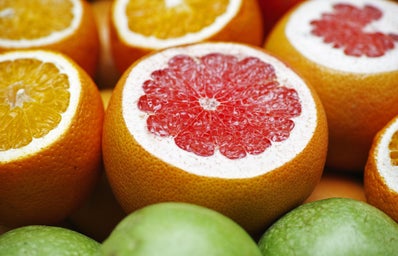Summer is out and fall has officially arrived. Unfortunately, that means saying farewell to yummy summer produce like avocados and mangos. Luckily, the colder months have just as many delicious and fresh fruits and veggies to offer! I’ve compiled a list of 10 super foods that are easily found during the fall and winter. The best part? You can buy these items frozen or fresh at the local supermarket, or at some of Philly’s great farmers markets at a very reasonable price.
Broccoli
This veggie is low in calories and high in sulforaphane, which has anti-cancer properties. Broccoli is also rich in vitamin K, lending assistance in blood clotting when you get that nasty paper cut, vitamin C to help build healthy bones and vitamin A to help with vision and strengthen your immune system. Broccoli also contains fiber, which promotes good digestive health. This is especially important for college women, who might not be eating very healthy all the time. Broccoli is best eaten fresh as to retain all of its nutritional value.
Try: Pairing raw broccoli with hummus for a midday snack, throw some in a stir fry with chicken and rice for a healthy dinner or try steaming it with lemon for a healthy side dish.
Brussels Sprouts
As kids, Brussels sprouts might have been one of the most dreaded vegetables. In college they’re one of the best foods to incorporate into your diet. These little heads of lettuce are loaded with vitamin A, potassium — which keeps your nervous system working hard — and fiber. These little guys are described as a snack that will “fill you up without filling you out.” Perfect for avoiding that freshman or sophomore 15!
Try: Roasting brussels sprouts in the oven with olive oil and salt for a nutritious and warm winter snack or saute with mushrooms and potatoes for a healthy morning hash.
Cranberries
Hail to the cranberries! This fruit isn’t just for holiday decorating. Available dried, frozen or fresh, these berries are some of winter’s best products. Cranberries are full of vitamin C and fiber and only measure in at about 45 calories per cup. This tiny fruit is famous for its massive amount of disease-fighting antioxidants. It out-ranks every other fruit and veggie except blueberries. Cranberries also last a long time, in any form. You don’t have to worry about this fruit going bad and wasting your money.
Try: Add dried cranberries to your cereal or oatmeal for a wholesome start to the day, add fresh cranberries to your roasted chicken or make a sauce to add to any meal.
Clementines
One clementine can provide a woman with about 50% of her recommended daily vitamin C intake. These mandarin and navel orange hybrids are packed with other nutrients too. If that’s not enough to persuade you to throw a couple in your purse for snack breaks between classes, clementines also contain about 1.3 grams of fiber. The fiber helps your digestive system absorb the healthy minerals from the other foods you eat. Citrus fruit, like clementines, are known for their cancer-fighting properties and helps build strong immune systems. If you live in a dorm during the winter, you need all the immune support you can get.
Try: Peeling and eating the fruit raw for a study snack, add slices to a salad for some sunshine in the winter or dip them in dark chocolate for a healthy alternative to ice cream for dessert!
Grapefruit
When it comes to winter super foods, grapefruit is king. A ruby red grapefruit curbs hunger, lowers bad cholesterol and is bursting with antioxidants. If you’re finding yourself packing on some winter weight, have no fear — grapefruit gives a boost to your metabolism and also produces healthy collagen for a smooth and glowing complexion. When it comes to dry skin in the winter, we need all the help we can get! But make sure you are careful with your consumption: Grapefruit can interact with prescription medication, like birth control.
Try: Eat this fruit straight from the rind with a spoon or by peeling it. Grapefruit is best consumed in its natural state or add it to a salad.
[pagebreak]
Kale
Everyone talks about kale. It is one of the best greens you can eat. The leafy green is high in fiber, rich in vitamin A and packed with calcium. The calcium in kale will help fight osteoporosis later in life. It’s important for women in their 20s to get enough calcium and let’s be honest — we might not drink as much milk as we should at college.
Try: Rip the leaf off the stem and add to a salad with mixed greens, steam the leaves like spinach or douse with some olive oil and cayenne pepper to bake in the oven for spicy kale chips.
Pomegranates
Even in the winter, the sun’s UV rays can do damage to your skin. Luckily, pomegranate seeds help limit that damage and increase collagen production in your skin. Pomegranates also contain paraoxonase, which helps control the build-up of bad cholesterol in your arteries. Pomegranates are also packed with polyphenolic flavonoids that help ride the mouth of plaque and bacteria.
Try: Eating the seeds straight or in yogurt. To remove seeds quickly and cleanly slice fruit in half, push out the center a little then hit the back of the fruit with a wooden spoon.
Sweet Potatoes
Sweet potatoes should show up more than just on Thanksgiving. A 3 oz. potato has only 90 calories and will keep you full for hours. Sweet potatoes are a healthier alternative to regular potatoes and they help fight cancers and heart disease. They also have a long shelf life, so you don’t have to eat them right away.
Try: Poke holes in the top, then pop one on the oven rack to roast for an hour. You can also cut them into sticks and bake for sweet potato home fries, or make a mash for a late night snack.
Beets
This purple root veggie has magnesium, iron, fiber, potassium, folic acid, and vitamins A, B and C. WOW! Beets are not only good for physical health, but mental health too. The vegetable contains trytophan and betaine, which are two chemicals that create a sense of well being in the brain. Beets are low in calories, but high in good sugars that release slowly into your system for bursts of energy. Beets are also an aphrodisiac, so you can serve them to your sweetheart.
Try: Roasting fresh beets or pickling them for a tangy aftertaste.
Lemon
Lemons are bursting with vitamin C and contains electrolytes which help hydrate your body. You can even rub lemon on your face for a natural acne and blackhead treatment! Just wash it off after 10 min.
Try: Slice up the fruit and add it to your water. Throw it in a pan with shrimp or chicken stir fry or use as an acne treatment.
With all of these options, you can forget about missing your favorite summer produce! With all of the options for mixing and matching the fruits and veggies of fall and winter, we can’t wait to hear what recipe’s you come up with!

